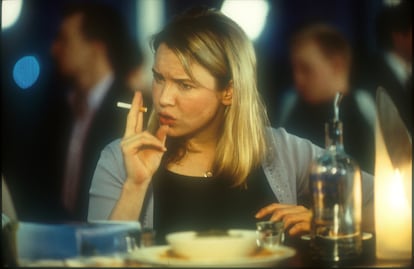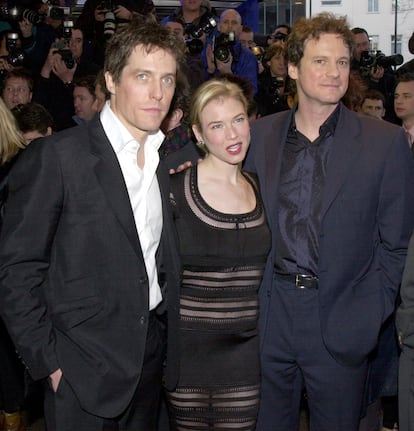Bridget Jones, 25 years later: The trouble with a character accused of normalizing harassment but who championed imperfection
Some criticize the way it normalized toxic behaviors, both male and female; some see it as the product of a bygone era that still works on many levels. It’s the novel that revolutionized the so-called chick lit genre

Bridget Jones was born in an opinion column in The Independent. It was winter 1995 and Helen Fielding, a British journalist and writer who was 37 at the time, was working on “an earnest and frankly unreadable novel about cultural divides in the Caribbean” when she received a redeeming assignment: she was asked to write a weekly piece about her life as a single woman approaching middle age in gentrified London at the turn of the millennium. It didn’t exactly fill her with enthusiasm, but she accepted because, by her own admission, she needed the money.
For the column, Fielding created a character that was a deranged, messy version of herself. She began to picture her in a series of situations more or less characteristic of the times: a hungover Sunday, merciless consumption of alcohol, tobacco and junk food. A Wednesday of journalistic interviews with real estate speculators and plastic surgeons. A Thursday of fighting the bathroom scale and a series of agonizing messages from her boss and occasional lover, who had begun to give her the brush-off, on her answering machine.
The first text, published on Tuesday, February 28, 1995, in the days that England danced to the rhythm of Madonna’s Bedtime Stories and Elastica’s Waking Up, began with a concise sentence that went straight to the point: “Oh why hasn’t Daniel rung?” Then it proceeded to tell us about Bridget’s weight: 9 stone (126 pounds, or as she put it, “irreversible slide into obesity”), and that she had smoked seven cigarettes, drank two “excellent” alcohol units and consumed 3,100 “poor” calories.
An unexpected success
The author assumed that no one would read that humble compendium of everyday calamities, that the column “would be dropped after six weeks for being too silly” and that before long she would be back in her fictional Caribbean, albeit with a few hundred pounds more in the bank.

However, that first diary of Bridget Jones was a success. In the opinion of The Atlantic staff writer Sophie Gilbert, it was thanks to Fielding’s suggestive narrative voice and Bridget’s commendable vulnerability. Jones was capable of self-hatred “while acknowledging that she’s worthy of being loved.” An empathetic and accurate picture of unrepentant single life, she alternated sips of Chardonnay and the guilty consumption of tubs of ice cream with “Gloria Gaynor-fueled roars of female empowerment.” Gilbert saw in her a champion of “the tired, the poor, the huddled masses yearning to be comfortably ensconced in functional relationships” and leave casual sex behind.
The rest is contemporary popular fiction history. The column became a book, published in the U.K. in 1996 before crossing the English Channel for its publication in the U.S. and many other countries in 1998, exactly one quarter of a century ago; then the book became a movie that was released to huge acclaim in 2001. After that would come three more books (the last one, Bridget Jones’s Baby: The Diaries, was published in 2016) and two other films to which one more could soon be added. All this has allowed Fielding to accumulate a net worth of more than $7.5 million.
Yesterday’s traumas in today’s wars
These days, coinciding with the 25th anniversary of the international edition of the book, novelist Elizabeth Egan has opened Pandora’s Box with a controversial article that was published in The New York Times. To Egan – who admits to having enjoyed the novel in her youth — Bridget Jones’s Diary has aged terribly. Both the protagonist and the millions of readers who found in her an example of contemporary femininity and a role model, she believes, “deserved better.”
Egan argues that Bridget should not have spent the best years of her life striving in the fruitless search of a Prince Charming. She never should have resigned herself to the recurring sexual harassment to which she was subjected by many men in her immediate environment, starting with her boss, Daniel Cleaver, always ready to take intolerable liberties with her body or inappropriately joke about the size of her breasts, or the lascivious Uncle Geoffrey, a friend of her parents that is obsessed with pinching her bottom. According to Egan, her kamikaze lifestyle — smoking, binge drinking, a dysfunctional, anarchic diet — is more pitiable than self-indulgent. There is nothing feminist about her reticent, sarcastic feminism. Her obsession with weight flatly crosses the line of body shaming. What’s more, the novel is not even funny anymore. Read from today’s perspective, her humor comes across as circumstantial, clumsy and dated.
What the author is suggesting, in short, is that the Bridget Jones from 1995 (like that of 1996 and the one from the film, since 2001, both virtually identical to the first one) is hardly compatible with the cultural climate generated by the emergence of the #MeToo movement and the consolidation of feminism 4.0. Helen Fielding herself seemed to accept this verdict with sportsmanship in the BBC2 documentary Being Bridget Jones, released two years ago. When asked if Bridget Jones’s Diary could be published as is in 2020, the writer replies with a smile and a brief: “Thank you, #MeToo.”
Predatory men and good friends
The author had already been quite explicit in her contribution to the collective essay Feminists Don’t Wear Pink and Other Lies, coordinated by Scarlet Curtis and published in 2018. In it, Fielding provides new fragments of the diary, illustrating Bridget’s point of view on a series of episodes of harassment suffered in the past, with phrases like, “I just accepted that part and parcel of having a job was that my boss would stare freely at my breasts, not know my name, and ask me to put a tight dress on to make an idiotic speech.” Or, “Richard Finch — who gave me my big break in television — [...] spent his entire time trying to get shots of my bum or my tits and generate ratings by humiliating me on camera. [...] None of that could happen now. [They] would lose their jobs, no question.”
Rosa Phelps, a columnist for Varsity, agrees with Sophie Gilbert in a hostile rereading of the chick lit classic. For her, “the ubiquity of unquestioned sexual harassment” damages both the first novel and its film version: “Predatory men, like Bridget’s lecherous boss Mr. Fitzherbert [Paul Brooke] whom she cheekily nicknames Mr. Titspervert, are often the butt of the joke. Today, it’s difficult to laugh along at the normalization of their behavior. The predators in Bridget Jones, however, aren’t always laughed away as pathetic creeps. The film also romanticizes harassment as an acceptable way to initiate a relationship.” In support of this latter notion, Phelps laments that Daniel Cleaver, played in the film by an attractive man (Hugh Grant), abuses his position of power by sending Bridget a lewd message (“PS: like your tits in that top”) to which she reacts by fantasizing about a future wedding.
Rebecca Nicholson writes in The Guardian that, despite everything, she still thinks that Bridget Jones’s Diary — the film — is “a gloriously messy ode to imperfection,” even if some elements of the British comedy “have aged quite notably.” She acknowledges its profound political incorrectness and its dubious place in today’s cultural context, but understands it as a product that extracts its comedy and nonsense from “a world that is no longer the same as it was.”
In the universe of the first Bridget Jones, Nicholson recalls, “the characters smoke at home, at parties, in restaurants, in pubs and in offices, as if it were Mad Men, not London in 2001.″ Similarly, 32-year-old Bridget is “obsessed with her weight and desperate not to become a spinster.” The context was different, and it is useless to judge that world of the past from the new certainties of the present.
Nicholson also acknowledges the positive aspects of the film, such as the unwavering belief that even the worst problems “can be resolved by an emergency committee of friends or family or both, summoned to hash it all out over cigarettes and alcohol.” A perspective, Nicholson concluded, that she found as delicious as it was “borderline cruel” when she allowed herself the guilty pleasure of watching the film during a time of social restrictions due to the Covid-19 pandemic.
Not for moralizers and snobs
However, the strongest defense of Bridget Jones, of the validity (and relevance) of her legacy, is perhaps the one made by Pravina Rudra in The New Statement. For her, “literary snobs” and “moralizing critics” do not get this novel because they “forget the importance of fiction holding up a mirror to society’s flaws.”

Rudra recalls that at the time, Fielding’s work even deserved “the praise of Salman Rushdie.” It also incorporated into the English language neologisms such as “fuckwits” or “smug marrieds” and made Renée Zellweger a superstar without her having to give up her image as a “normal” woman.
Rudra admits that Bridget Jones’s alleged “crimes” may seem somewhat serious in the context of 2023: she is obsessed with her weight, and her diary includes “an exhausting compendium of calories consumed.” She has an unhealthy obsession with her boss, who sends her disrespectful, arrogant messages. She doesn’t respect herself. However, Rudra continues, there is something greater at stake: “How do we begin to identify, let alone unpick, society’s problematic beliefs when they are not reflected back at us through flawed characters?” In other words, can we only empathize with perfect, immaculate heroines who reflect our values and aspirations with absolute consistency and without the slightest flaw?
“If we, say, pretend that no woman has an odd fixation with her weight, how do we begin to ask ourselves why the specter of ‘fatness’ haunts women in a way it does not men?” In reality, very few contemporary novels can boast of having started an “honest” debate about “the prevalence of low-key body dysmorphia in women.” Rudra recognizes these virtues and attributes the almost unanimous contempt that the novel arouses among certain critics to myopic elitism.
What’s more: there are academic works, such as one by translator Carolina Zamora Leal, in which Helen Fielding is credited with creating a successful, accurate and widely imitated idiolect that has come to enrich the British language. Expressions such as “incestuous sex-sandwich,” “singleton” or “shag-drunkenness” not only describe very specific realities with sharpness and wit: they also reflect a peculiar, pertinent and contemporary way of understanding life.
All of that (and much more) is still there, in the Bridget Jones of the column, the books and the movies, 25 years after the most illustrious fictional journalist since Lois Lane landed among us with all her fantasies, her causticity and her complexes. There is no need to defend her; Bridget Jones, for all her flaws, has always been able to defend herself.
Sign up for our weekly newsletter to get more English-language news coverage from EL PAÍS USA Edition
Tu suscripción se está usando en otro dispositivo
¿Quieres añadir otro usuario a tu suscripción?
Si continúas leyendo en este dispositivo, no se podrá leer en el otro.
FlechaTu suscripción se está usando en otro dispositivo y solo puedes acceder a EL PAÍS desde un dispositivo a la vez.
Si quieres compartir tu cuenta, cambia tu suscripción a la modalidad Premium, así podrás añadir otro usuario. Cada uno accederá con su propia cuenta de email, lo que os permitirá personalizar vuestra experiencia en EL PAÍS.
¿Tienes una suscripción de empresa? Accede aquí para contratar más cuentas.
En el caso de no saber quién está usando tu cuenta, te recomendamos cambiar tu contraseña aquí.
Si decides continuar compartiendo tu cuenta, este mensaje se mostrará en tu dispositivo y en el de la otra persona que está usando tu cuenta de forma indefinida, afectando a tu experiencia de lectura. Puedes consultar aquí los términos y condiciones de la suscripción digital.









































